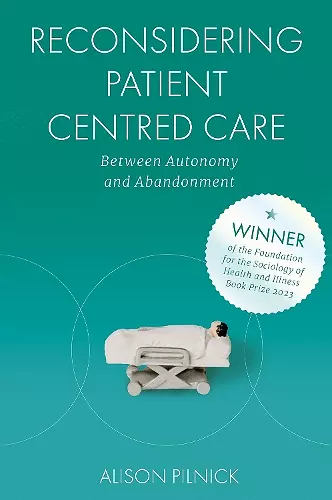Reconsidering Patient Centred Care
Between Autonomy and Abandonment
Format:Paperback
Publisher:Emerald Publishing Limited
Publishing:14th Mar '25
£34.99
This title is due to be published on 14th March, and will be despatched as soon as possible.
This paperback is available in another edition too:
- Hardback£68.99(9781800717442)

Winner of the Foundation for the Sociology of Health and Illness Book Prize 2023
In a major contribution to the sociology of medicine, Alison Pilnick shifts the terms of the debate around patient centred care (PCC). PCC is typically framed as a moral imperative, necessary to prevent a return to the outmoded medical paternalism of the past. However, empirical research repeatedly fails to show a clear link between the adoption of PCC and improvement in health outcomes. These results are largely considered as professional failings, to be remediated through ‘better’ training in PCC; as a result empirical research is largely focused on the extent to which practice does not live up to checklists of PCC criteria.
Through the detailed examination of a large corpus of healthcare interactions collected from a range of settings over a 25 year period, Pilnick illustrates the ways in which there are good organisational and interactional reasons for what may look from a PCC perspective like ‘bad’ healthcare practice. Conceptualisations of PCC typically foreground the importance of patient autonomy, to be exercised through choice and control; the analysis presented here highlights the problems with these consumerist underpinnings of PCC, and shows how the interactional consequence of attempting to enact them is often the sidelining of medical expertise that patients want or need.
Arguing that reform would be better directed at considering how this expertise can be re-centred in contemporary healthcare, the analysis illustrates why values-driven policy can be problematic in practice, and points to the importance of using analyses of healthcare interaction to inform healthcare policy making from the outset, rather than simply as a barometer of its success.
Reconsidering Patient Centred Care … is essential reading … it provides a convincing, empirically grounded assessment of patient centered care, which is being evaluated and judged both in relation to the logics and imperatives of real-life interaction in medical encounters and with reference to the societal purpose and function of medicine in the first place.
-- Melisa Stevanovic * Symbolic Interaction *The book would be enjoyable and useful to clinicians and policymakers, as well as sociologists. It shows the problems with widespread assumptions about what happens in the medical encounter. Such assumptions are taken as the starting point of policy interventions (and indeed sociological analyses) into many pressing issues and the book therefore successfully commends conversation analysis as a method for interrogating PCC by starting, not ending, with study of interaction itself.
-- Eleanor Kashouris, Kashouris, E. (2023), Reconsidering patient centred care: Between autonomy and abandonment. By Pilnick, Alison, Emerald. 2022. 168pp. £65 (hbck). ISBN: 9781800717442. Sociol Health Illn, 45: 1393-1394. https://doi.org/10.1111/1467-9566.13646The array of topics and extracts in this 5-chapter monograph shows how challenging PCC is for healthcare professionals to define and enact, particularly when PCC is competing with other institutional goals and service delivery constraints […] The book is potentially of interest to anyone involved in researching, developing, teaching or implementing healthcare policy and practice and may particularly appeal to clinical academics.
-- Avril Nicoll, Nicoll, A. (2023), Reconsidering patient centred care: Between autonomy and abandonment. By Pilnick, A. Bingley, Emerald Publishing Limited. 2022. pp. 168. £65.00 (hardback). ISBN: 9781800717442. Sociol Health Illn, 45: 1395-1396. https://doi.org/10.1111/1467-9566.13677This is a pathbreaking book in its use of conversation analysis to revisit core issues in medical sociology [...] It shows a deep knowledge of the history of debates in the field and a breadth of scholarship that situates conversation analysis firmly as a sociological practice. [...] This book clearly shows the value of detailed, painstaking and thorough empirical work for challenging self-defined assumptions of virtuous practice. It needs to be read by anyone with an interest in the communication skills of health professionals.
-- Robert Dingwall, Emeritus Professor of Sociology, Nottingham Trent Univer- Winner of Foundation for the Sociology of Health and Illness Book Prize 2023 (UK)
ISBN: 9781800717466
Dimensions: 229mm x 152mm x 9mm
Weight: unknown
168 pages